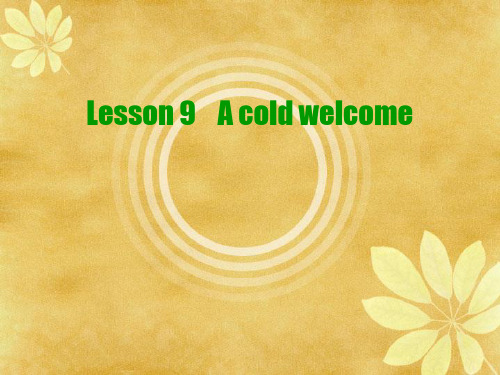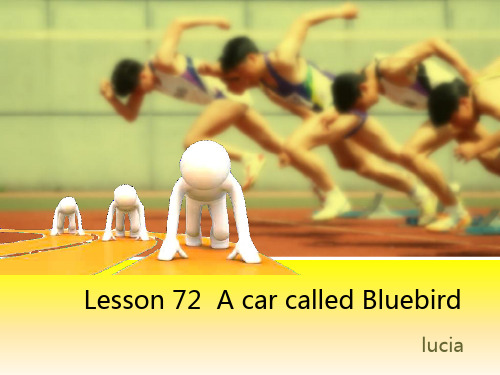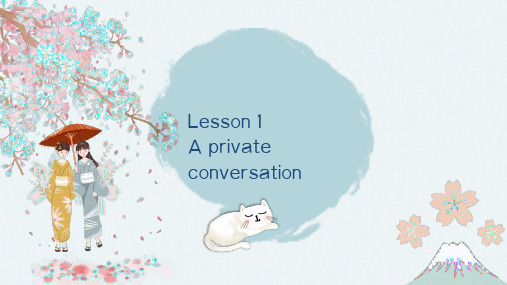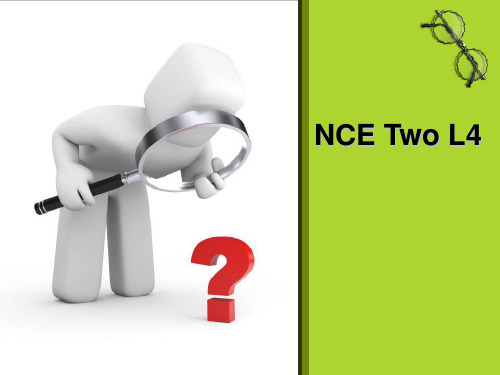新概念英语第二册__ppt课件
合集下载
新概念英语第二册课件Lesson 9 (共21张PPT)

• 2. (眉等)皱起
• 3. 生脓,化脓 名词 n. 1. 聚集
• 2. 收获量
gather指人们聚 集在一起,尤指 自发性的聚集
• 3. 衣褶
• refuse
美音:[rɪ'fjuz]
• refuse 1 及物动词 vt. 1. 拒绝;拒受;拒给;不准[O1] He refused my offer of help. 他拒绝了我的帮助。
1st •表示具体时间 on Wednesday
evenday
•用at的时间短语:
•表示确切时间 at five to twelve •表示用餐时间 at lunchtime •表示具体时间 at night
• during 在···期间 • during the hoilday 强调假期从头到尾 • from ···till ··· 指一段明确的时间 • until 直到 • until的主句和从句两个都用一般过去时(
refuse sb\sth refuse to do
•welcome 美音:['wɛlkəm]
• welcome sb to+地点 • a warm welcome 热烈的欢迎 • You are welcome to+地点
• strike
美音:[straɪk]
• v:打,击,弹,敲···(钟,乐器···)
• 5. 猜想,推测+(that) I gather that he is the one in charge. 我猜想他是负责的人。
• 6. 使皱起
She gathered her brows into a frown. 她皱起了眉。
• 不及物动词 vi. 1. 积聚;集合
新概念英语第二册PPT课件

• most +n. = most of the +n. 大多数的…… • most young people / most of the young people • will be waiting 将来进行时 • I will be right here waiting for you. • on the coast 在海边
某种技能) • teach sb. to do sth. 教某人做……(只是教, 会不会不管) • trainer n. 教练; trainee n. 受训的人 • training center 训练中心 • ★anxiously adv. 焦急 • anxious adj. 焦急的 • ★intend v. 打算 • intend to do sth.=be going to do sth. 打算做某事 • ★solid adj. 固体的, 硬的;n. 固体 • ① adj. 固体的
• between them 左右各一个人
• 限定性定语从句/非限定性定语从句(复习定语从句)
• 如果是有逗号的是非限定性定语从句, 没有逗号的是 限定性定语从句, 非限定性定语从句不可以用that, 限定性定语从句少了后面的句子, 这句话意思不完整, 非限定性定语从句前面的句子完整, 后面的句子起着 补充说明的作用,非限定性定语从句一旦有逗号隔开, 后面的句子和前面的句子关系不紧密, 起补充作用。
• 【Language points】
• 1、Across the Channel
• across 横渡
• the Channel=the English Channel 英吉利 海峡(当“C”大写时, 一定是指the English Channel)
• 2、She is going to set out from the French coast at five o'clock in the morning.
某种技能) • teach sb. to do sth. 教某人做……(只是教, 会不会不管) • trainer n. 教练; trainee n. 受训的人 • training center 训练中心 • ★anxiously adv. 焦急 • anxious adj. 焦急的 • ★intend v. 打算 • intend to do sth.=be going to do sth. 打算做某事 • ★solid adj. 固体的, 硬的;n. 固体 • ① adj. 固体的
• between them 左右各一个人
• 限定性定语从句/非限定性定语从句(复习定语从句)
• 如果是有逗号的是非限定性定语从句, 没有逗号的是 限定性定语从句, 非限定性定语从句不可以用that, 限定性定语从句少了后面的句子, 这句话意思不完整, 非限定性定语从句前面的句子完整, 后面的句子起着 补充说明的作用,非限定性定语从句一旦有逗号隔开, 后面的句子和前面的句子关系不紧密, 起补充作用。
• 【Language points】
• 1、Across the Channel
• across 横渡
• the Channel=the English Channel 英吉利 海峡(当“C”大写时, 一定是指the English Channel)
• 2、She is going to set out from the French coast at five o'clock in the morning.
新概念第二册 PPT 课件

旅游英语
将课程内容与旅游场景相 结合,教授学生在旅游过 程中如何运用英语进行沟 通和表达。
课程实践活动的组织与实施
小组讨论
组织学生进行小组讨论,培养学 生的团队协作和沟通能力,提高 学生的口语表达和听力理解能力
。
角色扮演
组织学生进行角色扮演活动,模拟 真实场景中的对话和交流,培养学 生的口语表达和听力理解能力。
倒装句。
03
课程实践与应用
听说读写各项技能训练
听力训练
通过播放英语音频材料,训练 学生的英语听力理解能力,提 高语音识别和信息捕捉能力。
口语训练
通过模拟真实场景的对话练习 ,培养学生的英语口语表达能 力,增强自信心和沟通技巧。
阅读训练
通过阅读英文文章和短篇小说 ,提高学生的阅读理解能力和 词汇量,培养阅读兴趣和习惯 。
03
和英语能力,以便更好地引导学生学习。
如何根据学生需求选择合适的教材
了解学生需求
在选择教材之前,教师应了解学生的 学习目标、英语水平、兴趣爱好等,
以便选择最适合学生的教材。
考虑学生的实际生活经验和背景,选 择更贴近学生需求的教材。
比较不同教材的特点
教师应对各种教材进行比较,了解其 特点、难度、教学方法等,以便为学 生选择最适合的教材。
教学内容:都涵盖了语法、词汇、阅读、听力等语言学习的各个方面。
与其他教材的异同点分析
• 教学方法:都采用了多种教学方法,如任务型教学、情景 教学等。
与其他教材的异同点分析
01
不同点
02
教材内容:新概念第二册与其他教材在内容上有所不同,新概念第二 册更注重实际应用,话题更贴近生活。
03
难度:新概念第二册的难度相对于其他教材略高,语法点和词汇量更 大。
新概念英语第二册课件Lesson19共58页PPT

I said.
• “也许已经开演了呢,”苏珊回答 说。
• 'It may have begun already,' Susan answered.
肯定 可能 可能 也许 也许
推测 must can could may might
真实性 95% 60% 40% 30% 20%
否定 can’t
can’t
can , could 表示能够
• 1. 表示会做 2. 或很可能做某事。
• 我会弹钢琴。 • I can play piano. • 我明天能来。 • I can • I couldn’t sleep last night.
Could (not) have done
A. wouldn’t B. can’t C. mustn’t D. needn’t
• Some people who don’t like to talk much are not necessarily shy;they ____ just be quiet people.
• A. must B. may C. should
• D. would
—Hi, Tom. Any idea where Jane is? —She_____ in the classroom. I saw her there just now. A. shall be B. should have been C. must be D. might have been
• “真可惜!”苏珊大声说。 • “What a pity!” Sue exclaimed.
Pity n.
• What a pity! • What a shame!
长大成人是多么遗憾的事啊。
• “也许已经开演了呢,”苏珊回答 说。
• 'It may have begun already,' Susan answered.
肯定 可能 可能 也许 也许
推测 must can could may might
真实性 95% 60% 40% 30% 20%
否定 can’t
can’t
can , could 表示能够
• 1. 表示会做 2. 或很可能做某事。
• 我会弹钢琴。 • I can play piano. • 我明天能来。 • I can • I couldn’t sleep last night.
Could (not) have done
A. wouldn’t B. can’t C. mustn’t D. needn’t
• Some people who don’t like to talk much are not necessarily shy;they ____ just be quiet people.
• A. must B. may C. should
• D. would
—Hi, Tom. Any idea where Jane is? —She_____ in the classroom. I saw her there just now. A. shall be B. should have been C. must be D. might have been
• “真可惜!”苏珊大声说。 • “What a pity!” Sue exclaimed.
Pity n.
• What a pity! • What a shame!
长大成人是多么遗憾的事啊。
第二册新概念英语NCE2_Lesson72 A car called Bluebird(共14页)最新精品课件.ppt

John came in.
2020/6/15
The great racing driver, Sir Malcolm Campbell, was the first man to drive at over 300 miles per hour.
She’s always the first to arrive and the last to leave. she 's always the first one to arrive and the last one
him. the first run 开始的行程 下一段赛程为 40 英里。 the next run is forty miles.
2020/6/15
Following in his father's footsteps many years later, Sir Malcolm's son, Donald, also set up a world record.
2020/6/15
burst (burst,burst) v.
burst v. 爆裂 ① vi. 爆炸,爆裂 A tyre burst during the second run. 气球爆炸 The balloon burst. ② vt.& vi. 突然打开 We burst the door open. While I was reading, the door burst open and
to leave. You’re the only person/one to complain.
CONLUDE:
the first /the last 以及表示最高级的如 the best, the most intelligent 等后可以用 to 引导的不定式 短语做定语
2020/6/15
The great racing driver, Sir Malcolm Campbell, was the first man to drive at over 300 miles per hour.
She’s always the first to arrive and the last to leave. she 's always the first one to arrive and the last one
him. the first run 开始的行程 下一段赛程为 40 英里。 the next run is forty miles.
2020/6/15
Following in his father's footsteps many years later, Sir Malcolm's son, Donald, also set up a world record.
2020/6/15
burst (burst,burst) v.
burst v. 爆裂 ① vi. 爆炸,爆裂 A tyre burst during the second run. 气球爆炸 The balloon burst. ② vt.& vi. 突然打开 We burst the door open. While I was reading, the door burst open and
to leave. You’re the only person/one to complain.
CONLUDE:
the first /the last 以及表示最高级的如 the best, the most intelligent 等后可以用 to 引导的不定式 短语做定语
新概念英语第二册第1课ppt课件

.
n. privacy 隐私.
It's my privacy. It's none of your business!
【反】 public adj. 公共的,公开的 .
New words
conversation n. 对话,谈话
.
have a conversation with sb 和某人有一个谈话 .
New words seat n. 座位 vt. 安排......坐下
. Have/take a/one's seat 请坐
..
请坐的2种说法 : Sit down,please.(命令性) Take your seat,please. (更礼貌)
New words angry adj. ___生__气__的_
Text
‘It's none of your business,' the young man said rudely. 'This is a private conversation!'.
Part 3 Grammar
Grammar
一、主+谓(谓语为不及物动词) The sun rises. He left.
ቤተ መጻሕፍቲ ባይዱ
--
angrily adv.生气地
--
rudely adv.无礼地,粗鲁地
New words
形容词变副词的规则:
1.一般情况下直接加“ly” quick---quickly, loud--loudly, real-really, slow-slowly, careful-carefully 2.以辅音字母加y结尾的变y为i,然后再加-ly happy---happily, easy-easily, busy-busily 3.少数以e结尾的形容词,要去掉e再加-ly true-truly, terrible-terribly,possible-possibly 但绝大多数以e结尾的形容词仍然直接加-ly。例如:rude-rudely, polite-politely, widewidely等。
新概念英语第二册第20课完整ppt课件

精选ppt
Lesson20 One man in a boat
• Fishing is my favourite sport.
• fish + ing = fishing • v. + ing = 动名词 (做主语) • I often fish for hours without catching
anything. • fish (v.) 钓鱼 • for + 一段时间 • without (prep.)没有 • He left without telling me. • catching 动名词做精宾选pp语t
• But this does not worry me.
• worry (v.) 使…担心
精选ppt
• ☺ 懂得,理解 = understand • catch the sentence
• ☺catch up with sb. • 赶上… • catch one’s atth fire • 着火
精选ppt
• 2. fish ☺(c. n.) 鱼
and doing nothing at all ! • only 只是 • = just • not at all
精选ppt
• Fishing is my favourite sport. I often fish for hours without catching anything. But this does not worry me. Some fishermen are unlucky. Instead of catching fish, they catch old boots and rubbish. I am even less lucky. I never catch anything-not even old boots.
新概念英语第二册 第1课 (共19张PPT)

3. I got very angry.
get 是逐渐变得的意思,接近become e.g. During the night, it got terribly cold.
4. I couldn’t hear the actor.
hear sb. 听见某人说话 hear from sb. 收到某人来信 hear of sb./sth. 知道某人(某事) hear about sth. 听说、得悉某消息 e.g. I can’t hear you.
summary writing.
1、where did the writer go last week? 2、did he enjoy the play or not? 3、who was sitting behind him? 4、were they talking loudly ,or they talking quietly ? 5、could the writer hear the actors or not? 6、did he turn around or not? 7、what did he say? 8、did the young man say ,“the play is not interesting”or did he say ,“this is a private conversation”?
New words
private
adj.私人的 personal. a private company; private life
conversation
n.谈话 talk have a conversation with sb. e.g. I had a quiet conversation with my closest friend. v. converse交谈
get 是逐渐变得的意思,接近become e.g. During the night, it got terribly cold.
4. I couldn’t hear the actor.
hear sb. 听见某人说话 hear from sb. 收到某人来信 hear of sb./sth. 知道某人(某事) hear about sth. 听说、得悉某消息 e.g. I can’t hear you.
summary writing.
1、where did the writer go last week? 2、did he enjoy the play or not? 3、who was sitting behind him? 4、were they talking loudly ,or they talking quietly ? 5、could the writer hear the actors or not? 6、did he turn around or not? 7、what did he say? 8、did the young man say ,“the play is not interesting”or did he say ,“this is a private conversation”?
New words
private
adj.私人的 personal. a private company; private life
conversation
n.谈话 talk have a conversation with sb. e.g. I had a quiet conversation with my closest friend. v. converse交谈
新概念英语第二册Lesson4课件(共25张PPT)

D.the same size as a village
Choose.
( C )11.He will soon visit Darwin. He will
visit Darwin _____.
A.quickly
B.for a short time
C.shortly
D.in a hurry
(C )12.He will fly to Perth. He will go
in the centre of Australia. He will soon ___v_is_i_t__(visit)7 Darwin. From there, he will __f_ly__t_o____(fly to)8 Perth. My brother has never been abroad before, so he is finding this trip very _in__t_e_r_e_s_t_i_n_g_
( B )4.-Have you ever _____ to Haikou? -Yes, I ____ there with my family
last August.(11海南) A.gone, went B.been, went C.been, went to D.been, was in
Thank you!
be different from difference the same
Translate.
1.我的房间与你的不同。 2.他们住在同一层楼。 3.How many differences can
you find?
abroad 国外
[əˈbrɔ:d ]
adv.
Translate.
新概念第二册英语时态课件 (共29张PPT)

时间状语从句(when, until after, before until, etc)
条件状语从句(if,unless, etc)
让步状语从句(though, although, etc)
1.一般现在时
3.表示永恒的真理,即使出现在过去的语境中,仍然用一般现 在时。
4. 在make sure (certain)=see to it, mind, care, matter + 宾
come true, consist of ,take place, happen, occur, break out, appear, arrive, die, fall, last, exist, fail, succeed, become, rise, 二、下列动词主动表被动,常与well, quite, easily, badly等连用
6、S+ was /were + being + pp….(过去进行时)
7、S+ has /have +been+ pp…. (现在完成时)
8、S+ had been + pp….
(过去完成时)
9、S+情态动词+ be+ pp….
(情态动词)
语态考点
一、不能用于被动语态的情况 所有不及物动词或不及物动词词组不用被动式:
❖ 表示状态存在的动词:be, exist, remain, stay, 等。 ❖ 表示占有或存属关系动词:have, own, belong, contain等。 ❖ 表示思考、理解等心理活动的动词:believe, doubt,
forget, know, remember, understand等。
条件状语从句(if,unless, etc)
让步状语从句(though, although, etc)
1.一般现在时
3.表示永恒的真理,即使出现在过去的语境中,仍然用一般现 在时。
4. 在make sure (certain)=see to it, mind, care, matter + 宾
come true, consist of ,take place, happen, occur, break out, appear, arrive, die, fall, last, exist, fail, succeed, become, rise, 二、下列动词主动表被动,常与well, quite, easily, badly等连用
6、S+ was /were + being + pp….(过去进行时)
7、S+ has /have +been+ pp…. (现在完成时)
8、S+ had been + pp….
(过去完成时)
9、S+情态动词+ be+ pp….
(情态动词)
语态考点
一、不能用于被动语态的情况 所有不及物动词或不及物动词词组不用被动式:
❖ 表示状态存在的动词:be, exist, remain, stay, 等。 ❖ 表示占有或存属关系动词:have, own, belong, contain等。 ❖ 表示思考、理解等心理活动的动词:believe, doubt,
forget, know, remember, understand等。
- 1、下载文档前请自行甄别文档内容的完整性,平台不提供额外的编辑、内容补充、找答案等附加服务。
- 2、"仅部分预览"的文档,不可在线预览部分如存在完整性等问题,可反馈申请退款(可完整预览的文档不适用该条件!)。
- 3、如文档侵犯您的权益,请联系客服反馈,我们会尽快为您处理(人工客服工作时间:9:00-18:30)。
• I lost my way in the forest, and to make matters worse, it became dark.
• rather adj. 相当的
To make matters worse, the room is rather small, so I have temporarily put my books on the floor.
• a short while ago 不久前(L35) • help sb (to) do sth 帮某人做某事(to 可省略) • get a big surprise 大吃一惊
‘This is the prettiest carpet I have ever seen,’she said. She gazed at it for some time then added,‘You don't need bookcases at all.
• He has a car of his own.
• He lives in his own house. • 4、To make matters worse, the room is rather small,
so I have temporarily put my books on the floor. • to make matters worse 更糟糕的是……,插入语
新概念英语第二册__Fra bibliotek1.Do you enjoy moving house/ changing the furniture in your room?
2. What is in your room? What are they made of?
What is the writer’s carpet made of?
A short while ago, my sister helped me to carry one of my old bookcases up the stairs. She went into my room and got a big surprise when she saw all those books on the floor.
• try to do sth. 尝试做某事
• in order : 有秩序, 有次序 • get sth. in order 使...有秩序(get 使役动词) • 这个小孩已经把他的玩具收拾好了。 • The kid has already got his toys in order.
• 3、This has not been easy because I own over a thousand books.
• to make matters worse 更糟糕的是 -插入语, 放在句子的开头,与主句之间用逗号隔开。
• rather adv.相当地 • temporarily ['tempərərili]adv. 临时地,暂时地 • adj. ? • temporary 临时的,暂时的 • temporary punishment 有期徒刑 • temporary worker 临时工 • temporary pleasure 一时的快乐
• ★own • ① vt. 拥有
• I own over a thousand books. • ② vt. &vi. 承认
• He owned to stealing the wallet.
• He owned (that) he had made a mistake. • ③ adj. 自己的
At the moment, they cover every inch of floor space and I actually have to walk on them to
get in or out of the room.
• at the moment =now现在 • ★inch [intʃ] n. 英寸(度量单位) • foot 英尺 , mile 英里 • 1 foot=12 inches; 1 mile = 5280 feet • Give him an inch and he will take a mile. • 得寸进尺 • ★space [speis] n. 空间 • ★actually ['æktʃuəli] adv. 实际上 • =in fact
• 现在完成时: have/has done • 现在完成进行时: have/has been doing • 现在完成时 : • 1、在漫长地时间段, 过去发生的事情,并对现在
产生影响 • 2、在过去发生的动作, 一直延续到现在 • 现在完成进行时:动作从过去到现在,可能还
会继续,强调持续不停
I have been trying to get my new room in order.
It is made of books.
1. Where has the writer just moved to? 2. How long has he been working? 3. What has he been trying to do? 4. Has this been difficult? Why? 5. Is the room big or small? 6. Where has he put his books? 7. What does he have to do if he wants to get in or
out of the room? 8. What did his sister help him to do? 9. Why was she surprised when she went into his
room? 10. What did she say about the books?
We have just moved into a new house and I have been working hard all morning.
• rather adj. 相当的
To make matters worse, the room is rather small, so I have temporarily put my books on the floor.
• a short while ago 不久前(L35) • help sb (to) do sth 帮某人做某事(to 可省略) • get a big surprise 大吃一惊
‘This is the prettiest carpet I have ever seen,’she said. She gazed at it for some time then added,‘You don't need bookcases at all.
• He has a car of his own.
• He lives in his own house. • 4、To make matters worse, the room is rather small,
so I have temporarily put my books on the floor. • to make matters worse 更糟糕的是……,插入语
新概念英语第二册__Fra bibliotek1.Do you enjoy moving house/ changing the furniture in your room?
2. What is in your room? What are they made of?
What is the writer’s carpet made of?
A short while ago, my sister helped me to carry one of my old bookcases up the stairs. She went into my room and got a big surprise when she saw all those books on the floor.
• try to do sth. 尝试做某事
• in order : 有秩序, 有次序 • get sth. in order 使...有秩序(get 使役动词) • 这个小孩已经把他的玩具收拾好了。 • The kid has already got his toys in order.
• 3、This has not been easy because I own over a thousand books.
• to make matters worse 更糟糕的是 -插入语, 放在句子的开头,与主句之间用逗号隔开。
• rather adv.相当地 • temporarily ['tempərərili]adv. 临时地,暂时地 • adj. ? • temporary 临时的,暂时的 • temporary punishment 有期徒刑 • temporary worker 临时工 • temporary pleasure 一时的快乐
• ★own • ① vt. 拥有
• I own over a thousand books. • ② vt. &vi. 承认
• He owned to stealing the wallet.
• He owned (that) he had made a mistake. • ③ adj. 自己的
At the moment, they cover every inch of floor space and I actually have to walk on them to
get in or out of the room.
• at the moment =now现在 • ★inch [intʃ] n. 英寸(度量单位) • foot 英尺 , mile 英里 • 1 foot=12 inches; 1 mile = 5280 feet • Give him an inch and he will take a mile. • 得寸进尺 • ★space [speis] n. 空间 • ★actually ['æktʃuəli] adv. 实际上 • =in fact
• 现在完成时: have/has done • 现在完成进行时: have/has been doing • 现在完成时 : • 1、在漫长地时间段, 过去发生的事情,并对现在
产生影响 • 2、在过去发生的动作, 一直延续到现在 • 现在完成进行时:动作从过去到现在,可能还
会继续,强调持续不停
I have been trying to get my new room in order.
It is made of books.
1. Where has the writer just moved to? 2. How long has he been working? 3. What has he been trying to do? 4. Has this been difficult? Why? 5. Is the room big or small? 6. Where has he put his books? 7. What does he have to do if he wants to get in or
out of the room? 8. What did his sister help him to do? 9. Why was she surprised when she went into his
room? 10. What did she say about the books?
We have just moved into a new house and I have been working hard all morning.
